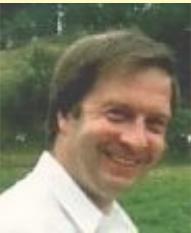SOME OF OUR EARLIER MEMBERS
DESCRIBE HOW THEY JOINED DUNAV
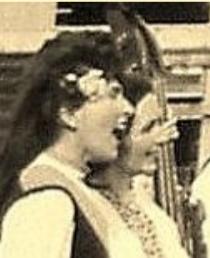
Nadia and Elizabeth Letsky (singers, 1964-68)
Nadia writes: I first heard about a group interested in playing Balkan music from my very good friend Henry Morris whom I had known when I was still at school. Elizabeth and I had fallen in love with Bulgarian music and sang songs using the 'open throat' technique as learnt from performers in the Kutev Ensemble whom we befriended during their London season at the Coliseum in 1955. Henry meanwhile was gathering a group of skilled performers to play Balkan music, and it was inevitable that we would want to make music together. Those early days building the ensemble were very fulfilling and exciting. I recall busy, creative sessions as we worked out how to present the exciting tunes and rhythms of Balkan music. We had some interesting initial engagements which included house parties and works canteen functions. There was a wonderful sense of purpose in introducing and sharing our joy of this music. Liz and I were so fortunate to have such a skilled group of instrumentalists to work with, and the period of our involvement with Dunav and particularly Henry Morris leaves very happy memories. We still sing the songs we sang with Dunav, but we miss the wonderful backing.
David Johnson (clarinet, 1969-1995)
In 1968 I was invited to a musical party and, as a result of my performance there, I was invited by the accordionist, Sue Coppard, to come to a Dunav rehearsal and see whether I liked Balkan folk music. I had never heard it before, and I was soon very interested because of the unusual rhythms, the wonderful tunes and the opportunity to show off a bit on the clarinet, having previously been restricted to the odd solos in classical music. So I joined Dunav, enjoyed making music and involving other people in our enjoyment at performances. David died in 2016.
Lilija Zobens (singer, 1975-2003)
My love of folk music stems from my background. My parents were refugees from Latvia, and I grew up in a house full of people who sang Latvian folksongs on the slightest pretext, often to alleviate their homesickness and forget their problems. I chose music as a career, but university music studies tended to be rather analytical, and I missed the directness and spontaneity of folk music. my professor advised me to try my hand at field work, to see if it really suited me, so in the summer of 1971 I trekked to Yugoslavia and found it a rich repository of musical styles and rituals rare or non-existent in western Europe. I was awareded a British Council Scholarship to study in Belgrade for a year, during which I learned a tremendous amount. It certainly changed my whole approach to life. When I returned, Hamdi Ataoglu introduced me to Dunav, who very sportingly took me on as a singer. It became an important part of my life because it gave me opportunities to perform music I love alongside people who, through music, became my friends.
Ileana Shirley-Smith (singer, 1986-2002)
I spent the first 20 years of my life in Romania. i was surrounded by song. Both my mother and our Hungarian maid sang folksongs from Transylvania and other parts of Romania. I first started singing myself when I came to England 20 years ago, partly from homesickness, learning the songs by ilstening to records. While I was working in a nursery I used to sing as I tidied and swept, and a colleague told me about Dunav. I went to one of their concerts in the Royal Festival Hall foyer and they invited me to an audition. I think I sang dreadfully but they asked me to come again. I am very grateful for having met them because otherwise I would never have developed my singing.
Dana Codorean Berciu (singer, 1992-2003)
On arriving in Britain in 1991 I was amazed and glad to hear, through Ileana, that there was a British group, Dunav, based in London that played east European folk music. I was invited to a rehearsal and timidly, full of emotion, I started singing again for the first time in 20 years. I had sung as a teenager in national folk festivals in Romania, and my homesickness made me want to sing again. I am very grateful to Dunav for 'adopting' me.
David Wells (violin, 1973 - 1985)
Being a musician on the folk scene, I had of course heard of Dunav. One night I was playing violin for the Czech group at rehearsal in Notting Hill Gate when an Indian gentleman approached me. It was Narendra, who suggested I might like to come and play violin for Dunav, as their own violinist, Hamdi, was having to leave the Group. I was a bit wary as the only Balkan music I had played was Rumanian, but I went to a rehearsal and was accepted. I also agreed to join Caroline playing at Naren's Balkan dance class near the Oval, and learned a lot of dance tunes and styles there.
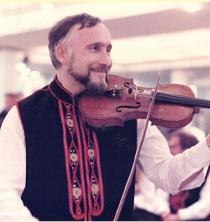
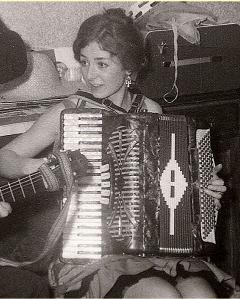
Susan Coppard (accordion, 1964-69)
It was early in1964, or possibly late1963, that I started thinking to myself I wish I knew some other people who play foreign music like I do. Finally, I had the bright idea of looking up the word International in the London telephone directory, and found International Folk Music Association, or something similar. I wrote a letter to the address, which turned out to be John and Olive Baldwin. John and Henry Morris had formed this Association in order to import a Bulgarian dance group to perform in the UK. John invited me over to tea at his house to meet him and Henry one Sunday afternoon. We had a nice little jam session and agreed to meet again one evening, and soon after that Naren joined us. At that point we were playing music from lots of different areas: Latin America, French, Italy, Greece and other Eastern European countries. After a while it was decided to specialise in Balkan music and call ourselves Dunav - which is how it all began.
Paula Gečević (singer, 1965-1970)
Paula (Pavlina) is from Serbia, where she performed both operatic and traditional songs and won many competitions. In 1951, at the age of 24, she was literally smuggled into UK in the boot of a car by an English friend of her family. The authorities caught up with her but allowed her to stay, and eventually she came to London to work as a nanny. The Serbian Church made her feel more at home, and she performed with Serbian musicians. One day she met Dunav and was invited to join them, bringing glamour, authentic style and a beautiful voice. Paula died on 12 October 2019.
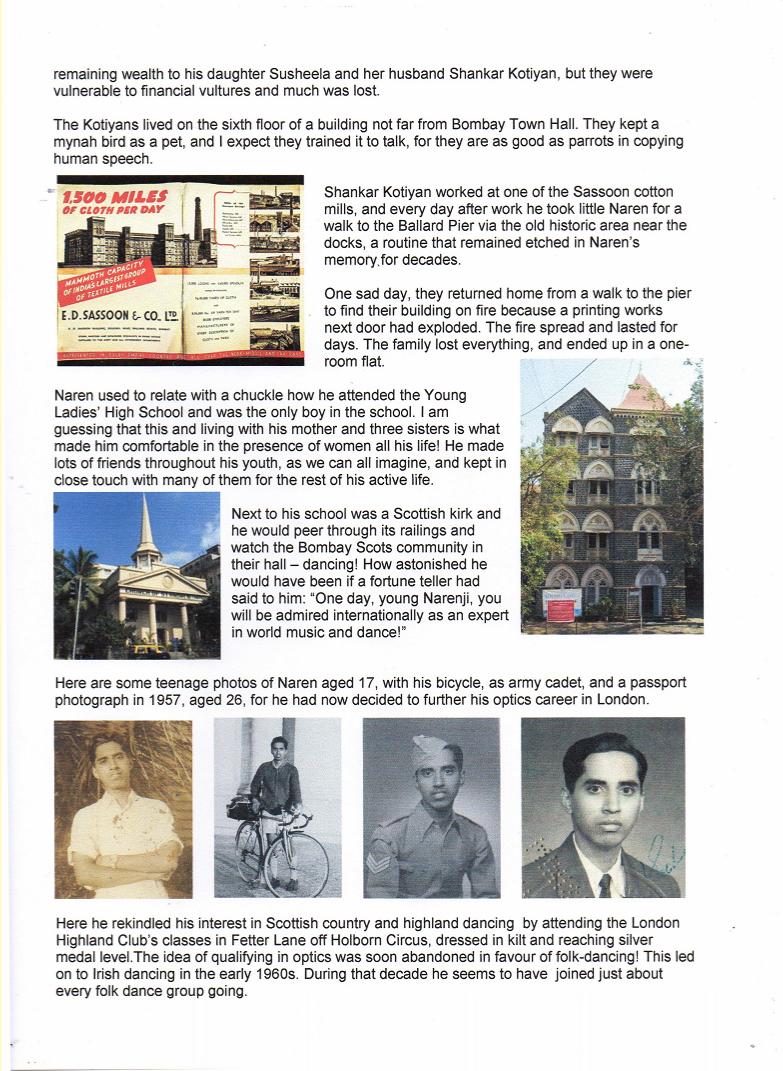
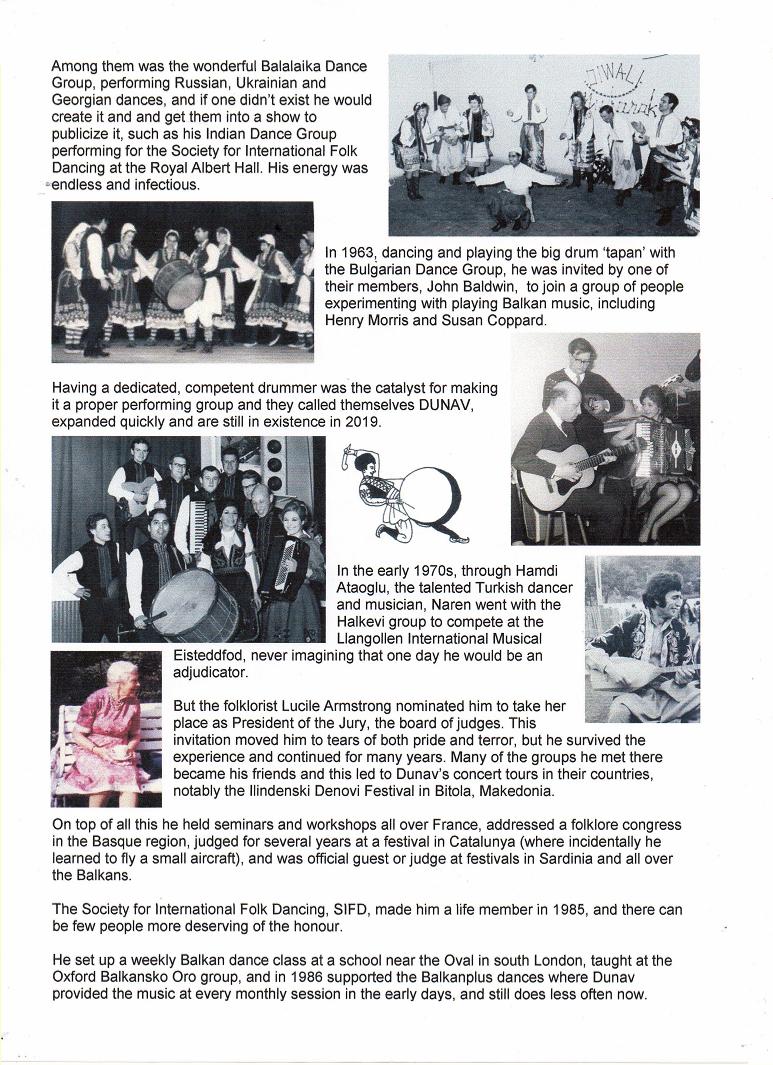
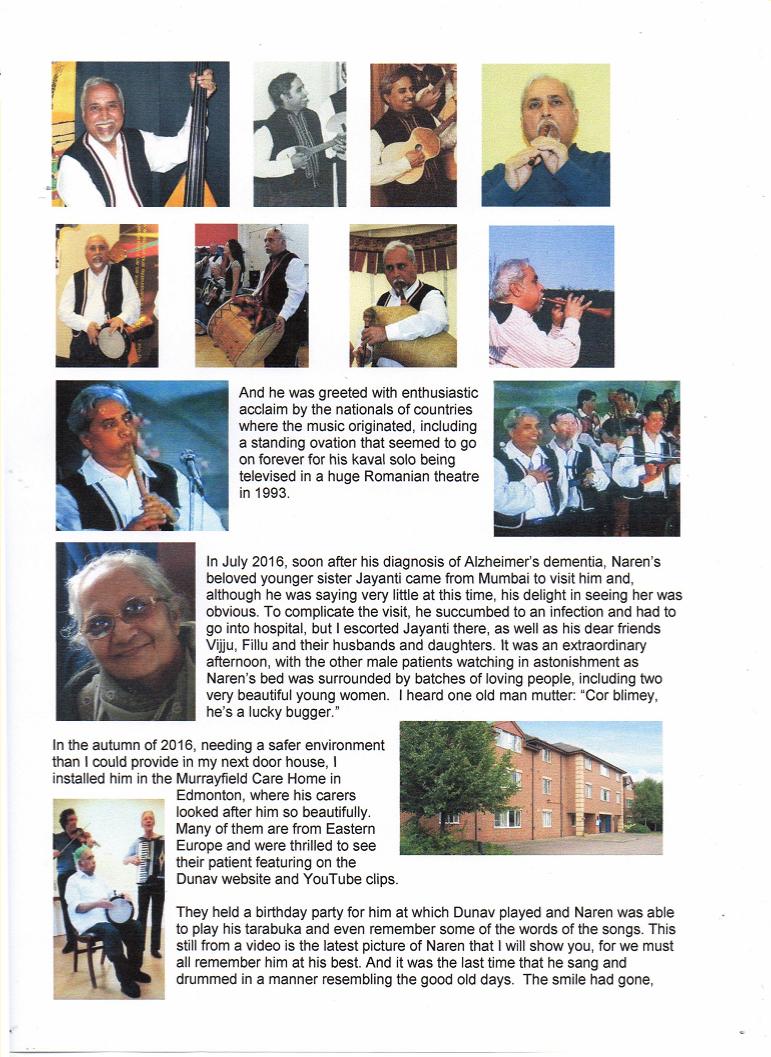
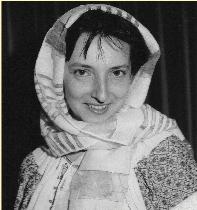
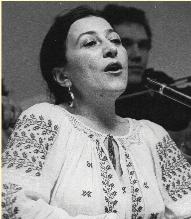
John Baldwin (tambura, tamburitsa) 1964 - 2006)
In 1952, at the age of 17, I was at an international youth camp in Sheffield, wandering around at about 2 in the morning looking for something to do, when I was transfixed by the most incredible musical sound I had ever heard. Next day I learned they were the 'Bulgarian Dance Group' from London, performing to a 78rpm record. I was teaching myself the mandolin at the time but could not even begin to play Bulgarian folk-dance music, so I joined them as a dancer. I tried the tapan and had no difficulty playing the rhythms on it. I was involved with the International Folk Music Centre, which arranged two visits in 1961 and 1963 of the Slovenian group Tine Rožanc, whose music created much of Dunav's early repertoire. The IFMC and other groups were starting to get musicians together to play and record international folk music. I suggested we might do the same with Balkan music, and it began with Henry Morris, Susan Coppard and me, followed shortly by Narendra Kotiyan. Soon I had moved from the mandolin to tambura and tamburitsa. Henry was the first leader, and our success was largely due to his energy and enthusiasm. Over the years our repertoire has grown to several hundred pieces.
(The above is an abbreviated version of a longer text by John in 1994.)
John died in 2013.
